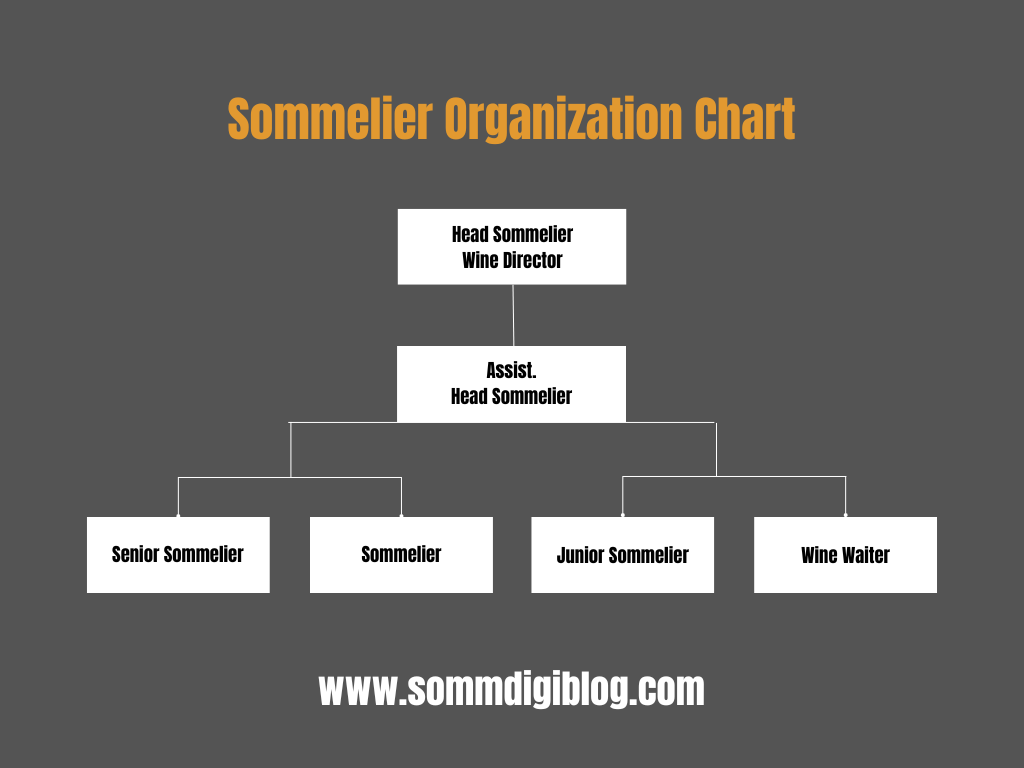Sommelier Level Up: Understanding the Different Ranks
Want to know more about the levels of sommeliers? This subject can be looked at from two different angles. First, there are the levels of sommelier certification, which are usually Level 1 through Level 4. Second, an organization has different levels of sommeliers, such as junior sommeliers, sommeliers, and head sommeliers. Read on to learn more about each sommelier level and what it means to be there.
A sommelier is a knowledgeable wine, and hospitality professional who selects, acquires, and serves wines. If you want to know more about the sommelier level, it’s important to understand the roles and responsibilities of each Sommelier level. This will help you understand what is expected of you when taking on such a position in the food and drink industry.
Highest Sommelier Level: Wine Director or Head Sommelier
"Wine Director" and "Head Sommelier" are both titles used in the hospitality industry to refer to the person in charge of managing a hotel's or restaurant's wine program. In some cases, the title "Wine Director" indicates a more senior or executive-level position, while "Head Sommelier" is more closely associated with an operational or supervisory role.
The Wine Director is a higher-level position in the wine team, often reporting to the Food and Beverage Director or General Manager. This person is responsible for the overall management of the wine program, including selecting and acquiring wines, developing and implementing wine education programs, and managing the wine service team. They may also be responsible for creating wine pairing suggestions, creating wine lists, and participating in wine-related marketing and promotional activities. They have a wide knowledge and experience in wine and wine service and must have a good relationship with the wine suppliers and distributors.
On the other hand, the Head Sommelier is more closely involved in the day-to-day operations of the wine program and typically reports to the Wine Director or General Manager. They oversee the wine service team, assist with stocktaking activities, and provide direct support to guests and team members when needed. They are also responsible for training new staff members to ensure an effective knowledge base amongst all workers in the department.
Head Sommelier
The Head Sommelier is in charge of managing the entire wine program within a restaurant or hotel. This includes stocking new wines, creating wine lists, training staff on wines, setting prices, and overseeing inventory control. They must also be well-versed in all aspects of guest service, as they will often be interacting directly with guests to provide advice on wine pairings and suggestions for their meals.
The position of a Head Sommelier or Wine Director is the highest level of sommelier in an organization chart. The Head Sommelier is not only in charge of wine but should also be in charge of all other drinks and be a good leader. They should also have strong leadership qualities because they will be responsible for managing a team of sommeliers.
Responsibilities:
Developing and maintaining relationships with wine vendors and suppliers
Organizing and hosting wine tastings and events
Creating and updating wine training materials for staff
Managing budgets and expenses related to the wine program
Ensuring compliance with all state and federal regulations regarding wine service
Continuously researching and staying current on industry trends and new wine releases
Developing and implementing strategies to increase wine sales
Participating in competitions and awards to promote the wine program
Qualifications:
Certified Sommelier certification or higher
Proven experience in a leadership role within the wine and hospitality industry
Strong knowledge of wine regions, grape varieties, and wine styles
Excellent communication and interpersonal skills
Strong organizational and budget management skills
Passion for and dedication to the wine industry
Ability to work well under pressure and handle multiple tasks at once
Strong attention to detail and ability to maintain accurate records
Willingness to continuously educate oneself and stay current on industry trends and developments.
Assistant Head Sommelier
The assistant head sommelier typically reports directly to the head sommelier. They are responsible for carrying out all duties assigned by the head sommelier and taking on any additional tasks that may arise. Additionally, they often assist guests with selecting appropriate wines from the wine list and ensuring that all tables are serviced efficiently and effectively.
The assistant head sommelier is also in charge of all the sommeliers' work schedules and putting out a weekly list of their days off.
The head sommelier's assistant is in charge of all office work.
Responsibilities:
Assisting the Head Sommelier with all aspects of the wine program
Providing wine recommendations and pairings to guests
Overseeing the work of the sommeliers and ensuring that all wine service is executed to the highest standard
Managing inventory and ordering new wines as needed
Assisting with wine tastings and events
Training new staff on wine service and menu offerings
Assisting with the creation and maintenance of wine lists
Assisting with compliance with all state and federal regulations regarding wine service
Assisting in maintaining accurate records of wine sales and inventory
Assisting in creating strategies to increase wine sales
Qualifications:
Sommelier certification or equivalent experience in wine service
Proven experience in a supervisory role within the wine industry
Strong knowledge of wine regions, grape varieties, and wine styles
Excellent communication and interpersonal skills
Strong organizational and budget management skills
Passion for and dedication to the wine industry
Ability to work well under pressure and handle multiple tasks at once
Strong attention to detail and ability to maintain accurate records
Willingness to continuously educate oneself and stay current on industry trends and developments
Ability to lead a team, time management, and prioritize tasks.
Senior Sommelier
A senior sommelier works closely with both the head and assistant head sommelier to maintain day-to-day operations within the restaurant or hotel. They are often responsible for organizing tastings and other events related to wine education, providing assistance with stocktaking activities, and providing direct support to guests and team members when needed. Additionally, they may be asked to assist in training new staff members to ensure an effective knowledge base amongst all workers in the department.
The senior sommelier is also in charge of managing the restaurant's inventory and attends daily briefings to update the team on wine.
Some additional responsibilities and duties of a senior sommelier may include the following:
Developing and maintaining relationships with wine suppliers and distributors
Creating wine lists and pairing suggestions for menu items
Assisting in the selection and acquisition of wines for the restaurant or hotel
Advising guests on wine selection and providing recommendations based on their preferences
Maintaining and updating wine storage systems, including temperature and humidity control
Assisting with wine-related marketing and promotional activities
Participating in wine competitions and events to stay current on industry trends
Assisting in developing and implementing wine education programs for staff and guests.
Junior Sommelier
A Junior Sommelier is an entry-level position in the wine service team, typically filled by someone who is just starting in the field or has limited experience. They work closely with more experienced staff members, including the Senior Sommelier, to learn about all aspects of the job and develop the skills and knowledge needed to advance to higher positions within the organization. The primary responsibilities of a Junior Sommelier include the following:
Assisting more experienced staff members in daily operations
Learning about different types of wines, including grape varieties, regions, and winemaking techniques
Learning in the selection and acquisition of wines for the restaurant or hotel
Learning in the development and implementation of wine education programs for staff and guests
Learning about wine service techniques and etiquette
Assisting in the maintenance and organization of wine storage systems, including temperature and humidity control
Assisting senior sommeliers in managing the restaurant's inventory, including tracking wine orders, deliveries, and stock levels
Assisting in the training of new staff members to ensure an effective knowledge base amongst all workers in the department
Junior or Commis sommeliers are often responsible for cleaning and wiping wine glasses and setting up the wine station before service. This may include polishing and arranging glasses, preparing decanters, and ensuring that all necessary tools and equipment are in place and ready for use. They may also be responsible for maintaining the cleanliness and organization of the wine cellar, including wiping down bottles, keeping labels facing forward, and organizing the storage racks. These tasks are important for ensuring that the wine service runs smoothly and that guests have a positive experience.
The primary duties of a junior sommelier also include inventory control, cleaning wine glasses, and maintaining an orderly and clean wine cellar.
Sommelier Level Up: The Wine Waiter's Path
A wine waiter, also known as a wine steward, is a front-line staff member in the wine service team responsible for serving guests in a restaurant, hotel, or cruise ship. They typically have less training and experience than a sommelier, and their primary focus is on providing excellent service to guests rather than on the technical aspects of wine.
Conclusion:
Whether you’re looking for a career change or already have some experience working in restaurants or hotels as a sommelier, understanding these different levels can help you understand how best to move forward with your career aspirations in this field. Each level has responsibilities that require specialized skill sets but can offer rewarding experiences if done correctly! With some hard work and dedication, you can rise through these levels quickly while gaining valuable experience!
Would like to read more of the article about sommeliers. Please check out our links for sommeliers.




